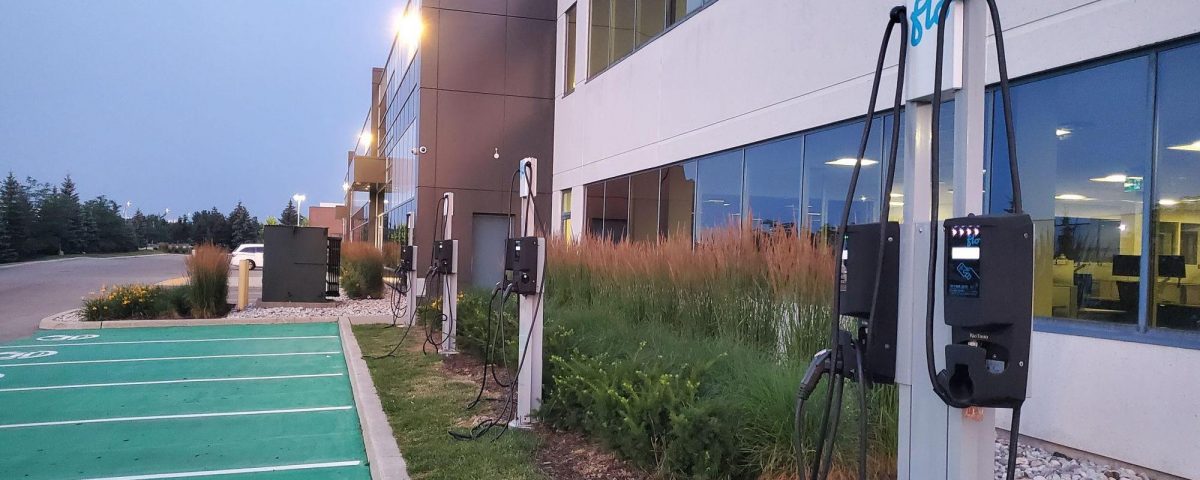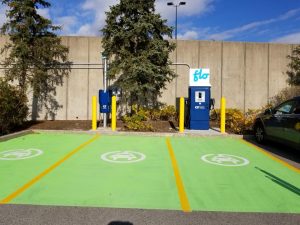Electric vehicle charging stations: an overview for commercial landlords
Armadale Property Management: Leaders in Commercial Condominium Management
February 23, 2022Electric vehicle charging stations: an overview for commercial landlords

Electric vehicle charging stations - commercial setting
With gas prices at the highest they’ve been in a generation, and with the country opening up to travel following two years of pandemic-related closure, electric vehicles (EVs) are poised to become attractive propositions for many new Canadian drivers. And electric vehicle charging stations will naturally follow.
This also opens up new opportunities for those with commercial properties, as these electric cars and trucks will require to be readily available along all points of the journey.
The environmental benefits of hosting EV chargers are obvious, as property managers are helping to lower greenhouse gas emissions and encouraging an overall movement away from fossil fuel consumption. Firms that have sustainability goals are able to meet them in this way. Internally, hosting EV charging can help green-minded businesses attract employees who are environmentally-conscious into the organization.

Electric vehicle charging stations – commercial setting
As a fairly recent revenue generating option, EV charging stations and everything involved in their costs, upkeep, and day-to-day management are largely unknown to landlords.
Alan Czechowski, Business Development Manager at FLO, offers a general overview of the realities and potential of hosting EV charging stations on your commercial property.
The Basics
There are three levels of vehicle charging stations on the market today.
“Level 1 chargers are designed to be plugged into wall outlets at home when the vehicle is not in use,” says Czechowski. “These are included with every EV purchase with no need for commercial manufacturing.”
Level 2 chargers are considered “middle of the road” options, and one of the two types that are available to commercial property owners. “These will give you a charge worth about 30-40 kilometres per charging hour,” says Czechowski. “These are most commonly found in places where cars are parked for long periods of the day, such as workplaces. If all you’re doing is commuting to work from home, these would be most useful to you.”
Finally, Level 3 chargers are usually found on or along major highways and are designed for individuals taking much longer drives, such as for vacations and touring, offering 250 to 400 kilometres per charging hour.
Charging Time, Charging Rates, and Power Management
How long does it take to charge an electric car at a charging station?
“The vehicle tells the charger how much power to give it,” says Czechowski, “so it really depends on the vehicle’s battery management system. In general, on Level 2 charging, you get 30-40 kilometres in an hour of charging, and with Level 3, you get 250-400 km in an hour.
Given the dramatic difference between Level 2 and Level 3 charging yields and times, it’s important to consider just what the costs would be to a landlord. Fortunately, the station owners are the ones who can set the rate, which averages (as of April 2022) at roughly $1.50 per hour for Level 2 chargers and $20 per hour on Level 3 chargers. Owners are able to adjust these prices in response to usage demand as well as the growing numbers of electric vehicles on the roads.
Landlords looking to invest in EV stations are generally concerned with power management and incremental electricity costs. Czechowski notes that this is variable depending on the vehicles, the type of charging, and how often the chargers are being used. “It’s a ballpark figure,” he says. “The good thing about our stations is that we can manage them. We have power sharing, where you can add multiple chargers to a single circuit, or power limiting, meaning you can limit the overall amount of power going to the station. There are different ways to manage the power and the consumption with our EV chargers.”
As leaders in the Canadian EV charging industry, FLO manufactures Level 2 and 3 chargers for commercial use (they don’t build Level 1 chargers, as those are provided by the OEM of the electric vehicle upon purchase), and can readily help commercial clients decide what would be the best fit. “We know about the different regulations,” says Czechowski, “as well as the different government funding programs that clients can leverage. Depending on what you are interested in or capable of taking on, we can help you determine the right level of charger and the appropriate number of chargers on the property.”
Station Management
“Our EV chargers provide the station owners with an easy-to-use web portal,” says Czechowski, “where they can easily manage all the settings of their chargers, including the revenue, the access controls, the energy management, and they can also extract usage reports from their owner web portal.”
The network chargers also allow people different ways to move their vehicles. One drawback of EV stations is that, in cases where the number of chargers is small, some users will simply park their vehicles, connect them, and leave them there all day, depriving others from being able to use them, which can be critical if their vehicle batteries are low. “It keeps people from hogging the charging stations all day. We have graduated or continuous billing, so it encourages drivers to not overstay their welcome and move their vehicles.”
Cons of EV Stations for Landlords
There are clearly many benefits for commercial landlords who host EV stations, but there are also costs involved, both financial and logistical.
Most of the costs incurred by landlords comes from the installation itself, as depending on the property plan, the EV stations could be some distance away from the electrical source, requiring potentially expensive renovations. Further, there would be a loss of available parking spaces as a few of them are dedicated for EV charging, which can be a potential strain for smaller properties. There is also having to manage access to the stations depending on the intended use. For example, a private office company with dedicated EV parking spaces for its employees may have members of the public entering the property to use the stations for themselves.
Fortunately, as Czechowski notes, manufacturers such as FLO can help with these issues.
“We can consult you on your installation to help minimize costs and impact, customized for your own unique property needs. We’re a manufacturer and network operator, meaning that we sell the EV chargers and once they’re installed, we manage the network. You have your up-front cost, and then your ongoing fee for our Global Management Service, which is one of the best in North America.”
As leaders in the property management industry for over 30 years, Armadale Property Management helps you adapt to the realities of a greener, more sustainable future. Contact us today to learn more.
